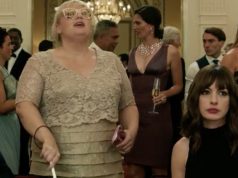“Brokeback Mountain” is the story of two people who fall in love with the person they least expected to. In that regard, it is no different from hundreds of other movies about mismatched couples and surprise romances. That the romance is doomed and tragic is not particularly uncommon, either. That it involves two men … OK, now we’re into somewhat less familiar territory. That it’s all of those things, plus powerful and moving enough to be one of the best films of the year, is extraordinary.
Ang Lee’s poetic, beautifully rendered version of E. Annie Proulx’s short story (adapted by “Lonesome Dove’s” Larry McMurtry and Diana Ossana) is elegant to behold and poignant to contemplate. It’s a mournful love story, fraught with unexpressed emotions, sad realities and terrible losses. But when I think about the movie, I smile. The story is told so masterfully, and the emotions evoked so completely, that I’m more overcome by what a good film it is than by how “sad” certain elements of it might be. Plus, there’s that final scene, which is so sweet and disarmingly tender….
It is 1963 when Jack Twist (Jake Gyllenhaal) and Ennis Del Mar (Heath Ledger) meet in Signal, Wyo. The two cowboys are hired by a rancher named Aguirre (Randy Quaid) to take care of his sheep up on Brokeback Mountain for the summer. This puts them in isolation for three months, no human but themselves around for miles.
Ennis is taciturn and stoic, the quintessential Marlboro Man cowboy, down to his guttural voice and squinty eyes. Jack is slightly more talkative and showy, having been a rodeo rider before he came to Wyoming. When Ennis tells Jack a story about his past, Jack says, “That’s more words than you’ve spoken in the last two weeks.” Ennis, not given to introspection but here realizing something about himself, smiles and says, “That’s more words than I’ve spoken in the last two years.”
It’s on a cold night in the tent that it happens. Jack is the instigator, but Ennis does not resist for more than a moment. They have fallen recklessly and violently — improbably and hopelessly — in love.
Yet the word “love” is not used. Neither, for that matter, is the word “sex,” not until very late in the film (and then it’s a synonym). As their relationship continues over the next two decades, parted by geography and their separate marriages and reunited a few times a year for “fishing trips,” all they ever call it is “this thing.” It IS love, and there is sex involved, but those aren’t the words they use to describe it. It’s simply “this thing.”
What’s notable about “Brokeback Mountain” is what’s NOT in it. Despite its reputation as a “gay cowboy” movie, there is but one sex scene between the two men, and it occurs fully clothed. Meanwhile, there are three boy-girl sex scenes, and altogether more female nudity than male.
There are also no sociopolitical messages. If the film is nothing more than propaganda for the “gay agenda,” as some have suggested, you’d expect there to be speeches where Ennis and Jack decry the current state of affairs and wistfully long for a day when they’ll be accepted in society. Yet there’s nothing of the kind. Quite the opposite, actually. They acknowledge that if they were to run off together, their living arrangement would be socially unwise and even physically dangerous, and neither of them says that things “ought” to be otherwise. They’re cowboys, after all, given to stoicism, not fantasizing or activism. “If you can’t fix it, you gotta stand it,” Ennis says, his point being that this particular situation cannot be fixed.
The two women in the film are Michelle Williams as Ennis’ wife Alma and Anne Hathaway as Jack’s wife Lureen. They never meet each other. Jack and Ennis only communicate via postcard, just enough for Jack to say, “Fishing trip in three weeks?” and Ennis to reply, “Sure.” Alma is suspicious of the arrangement but terrified to investigate it. Lureen is content to run rough-shod over her husband — she’s a rodeo-rider too — and to let her austere father do the same.
Gyllenhaal’s and Ledger’s performances are both subtly brilliant. Neither man’s character says much, so they make what dialogue there is rife with import. Body language and facial expressions speak volumes, too, particularly in the way they interact with each other. You can tell by watching them together what their backgrounds are and what roles they play in the relationship: Jack can’t please his father, has longings he can’t understand, and wishes he had someone he could talk to about it; Ennis is fiercely independent, doesn’t brood over his feelings, and often seems “above” the whole sloppy notion of being in love even though he is in fact very deeply in love.
Like all great films, this one finds universal themes in an unusual and specific story. Anyone who has been in love will see himself or herself in Jack or Ennis. Their story has many of the conventions of a typical troubled-relationship movie, translated into the language of two cowboys who are at a loss to explain what has happened to them.
A (2 hrs., 14 min.; )





